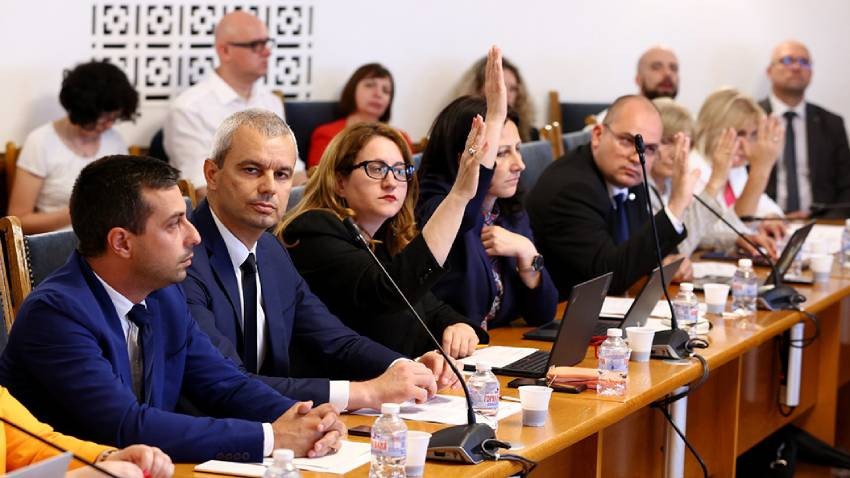The majority in the National Assembly, i.e. GERB/SDS and We Continue the Change/Democratic Bulgaria (PP/DB) and the Movement for Rights and Freedoms, rejected the proposal by the nationalist party Vazrazhdane for the holding of a referendum on keeping the Bulgarian Lev as the sole “official” currency over the next 20 years.
According to the law (on direct citizen participation in governance), when the proposal is made by an organizing committee via a petition containing the signatures of no less than 400,000 Bulgarian citizens who are eligible to vote and meets the requirements of the law, the National Assembly is obligated to adopt a decision for the holding of a referendum.
When in April Vazrazhdane submitted 590,000 signatures in favour of holding a referendum asking the question: “Do you agree to the Bulgarian Lev remaining the only official currency in Bulgaria until 2043?”, the probe that followed established that 470,000 of them were valid. And even though the 400,000 threshold had been cleared, the majority rejected the proposal with the motive that the question asked in the referendum does not comply with the law. However, after the proposal was voted in plenary, doubts arose as to what it was the MPs had actually voted.
According to Vazrazhdane, what was voted in plenary was the draft decision of the legal affairs committee, which had rejected the referendum a few days before, as contradicting Bulgaria’s EU accession treaty, and not the proposal for a referendum. By voting against the draft decision, instead of against the referendum,Vazrazhdane says the MPs are allowing the holding of a referendum. Consequently, Vazrazhdane leader Kostadin Kostadinov urged President Rumen Radev to set a date for the referendum and to refer the matter to the Constitutional Court.

However, the MPs who voted against the decision rejected Vazrazhdane’s allegations, saying that what had been voted in plenary was the draft of a decision on holding a referendum.
“If we read the law carefully, we shall see that what the parliamentary committee is proposing should be voted in plenary,” Assoc. Prof. Natalia Kiselova, who lectures constitutional law, explains in an interview with the BNR. “As a rule, the committee should submit a positive draft of a decision. In this case – the referendum on the Lev – it is proposing a negative draft decision, and Rositsa Kirova, who was chairing the parliamentary sitting at the time, called for a positive vote. That is the reason why there was such a discrepancy regarding what the MPs were voting. The rules of voting were, in fact broken, because it should have been based on the draft of the committee. Still, that does not give us grounds to say there has been reverse voting.”
Assoc. Prof. Kiselova points out further that for there to be another vote, someone has to submit a draft. The president cannot set a date for the holding of the referendum either, because the National Assembly has not voted in favour of a referfendum. At the same time the Constitution and the Constitutional Court allow for the president’s taking a political position, and in this sense he could intervene. Besides the president, the matter could be referred to the Constitutional Court by one-fifth of the members of parliament because:
“The organizing committee does not have the right to refer the matter to the Constitutional Court which is one of the so-called “democratic” provisions of the law,” says political analyst Toncho Kraevski in an interview with the BNR. “That is something that can be done by the members of parliament. However, the Constitutional Court cannot consider the substance of the controversy, whether the question of keeping the Bulgarian Lev in the next 20 years constitutes a breach of a specific commitment Bulgaria has assumed under an international agreement or not. In parliament, where this matter should have been cleared up, no specific commitment or specific text was cited. No specific way it is violated was indicated either, and this points to a lack of arguments.”
According to Assoc. Prof. Kiselova, the referendum raises two important questions “for” and “against” the euro, and “for” and “against” direct democracy, and that is what makes the debates at the legal affairs committee and in plenary so valuable:
“The supporters of the referendum equate the two,” comments Assoc. Prof. Kiselova. “But in actual fact the problem is about whether the citizens should be asked about certain issues, and the fear of the members of parliament of getting a resounding slap in the face if they allow a given question to be asked in a referendum.”
Toncho Kraevski agreed, and went on to make a retrospection of the referendums organized so far in Bulgaria’s history, stating that by writing this law, law-makers have placed themselves in the position of deciding whether the referendum falls within the substantive scope of the law or not. This, he says, means “a political decision clad in legal reasoning, which continues the long-standing tradition of using the referendums as a highly-politicized instrument only in times when those in power feel strong, sure of themselves and certain what the outcome of the referendum will be.”
Interviews by Silvia Velikova and Daniela Goleminova, Horizont channel, BNR
Compiled by Yoan Kolev
Translated from the Bulgarian and posted by Milena Daynova
Photos: BGNES, Ani Petrova-BNR
In Brussels, Bulgaria and North Macedonia reaffirmed their commitment to continue the construction of Railway Corridor No. 8 under the TEN-T Regulation, reported the European Commission’s Directorate General for Neighborhood Policy and Enlargement..
A Taiwanese technology giant is negotiating to build a large production facility on the territory of the Trakia Economic Zone near Plovdiv, announced caretaker Minister of Innovation and Growth Rosen Karadimov. He was briefed with the progress of the..
A Japanese-Bulgarian business forum is being held in Sofia, organized jointly by the Japan External Trade Organization (JETRO ) and the Bulgaria Invest Agency . "I am leading a delegation of a hundred people, a fact that speaks volumes about..

+359 2 9336 661
